

Thomas Edison State College Pioneers Alternative Paths. Quad Learning. Quad Learning, Inc. was founded in 2012 with the goal of creating more affordable pathways for students to earn their bachelor’s degree.
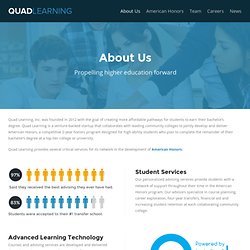
Quad Learning is a venture-backed startup that collaborates with leading community colleges to jointly develop and deliver American Honors, a competitive 2-year honors program designed for high ability students who plan to complete the remainder of their bachelor’s degree at a top-tier college or university. Quad Learning provides several critical services for its network in the development of American Honors: Student Services Our personalized advising services provide students with a network of support throughout their time in the American Honors program. Our advisors specialize in course planning, career exploration, four-year transfers, financial aid and increasing student retention at each collaborating community college. Syllabus Geeks. Reading Week spent in the ‘real world’ Reading Week spent in the ‘real world’ Posted on February 5, 2013 by admin As Reading Week approaches, many universities are putting the final touches on their plans to send students into the “real world” to do Community Service Learning projects (sometimes called Alternative Spring Break projects).
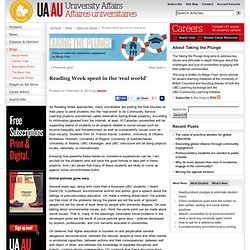
According to information gleaned from the Internet, at least 10 Canadian universities will be supporting teams of students to do projects related to social issues such as income inequality and homelessness as well as sustainability issues such as food security. Students from St. Francis Xavier, Carleton, University of Ottawa, McMaster, Western, University of Regina, University of Saskatchewan, University of Alberta, UBC Okanagan, and UBC Vancouver will be doing projects locally, nationally, or internationally.
How to Save College. Udacity, San Jose State University offer online classes for credit. American Council on Education Recommends 5 MOOCs for Credit - Technology. By Steve Kolowich In what could be a major step toward bridging the gap between massive open online courses and the credentialing system that they are supposed to "disrupt," the American Council on Education on Thursday endorsed five MOOCs for credit.
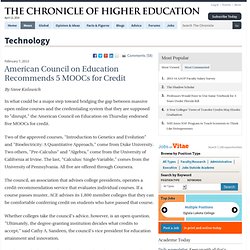
Two of the approved courses, "Introduction to Genetics and Evolution" and "Bioelectricity: A Quantitative Approach," come from Duke University. Two others, "Pre-Calculus" and "Algebra," come from the University of California at Irvine. The last, "Calculus: Single-Variable," comes from the University of Pennsylvania. All five are offered through Coursera. The council, an association that advises college presidents, operates a credit-recommendation service that evaluates individual courses.
Whether colleges take the council's advice, however, is an open question. UnCollege - Hacking Your Education.
Alternative Degree Options. Re:BOOT California Reform. At P-TECH, Educators and Employers Work Together to Solve the Skills Gap. This story is the fourth in a six part editorial series exploring the balance between student learning and job skills.
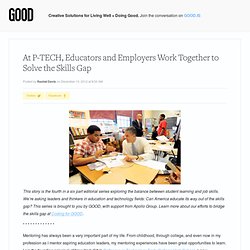
We’re asking leaders and thinkers in education and technology fields: Can America educate its way out of the skills gap? This series is brought to you by GOOD, with support from Apollo Group. Semester Online. Bridge to Learning - Educational Research. Hardly a day goes by without the announcement of a new MOOC or a new tie up between universities to offer MOOCs. this despite widespread scepticism amongst educationalists as to the pedagogic model being offered by the ‘commercial’ or x-MOOC providers or indeed any particularly convincing financial model. And yet the original idea behind the MOOC as developed by Downes, Siemens and others is not dead. Today I received an email from Yishay Mor about a new MOOC being launched in early 2013. American Association of State Colleges and Universities. Graduate Enrollment and Degrees: 2001 to 2011. The complete survey report, Graduate Enrollment and Degrees: 2001 to 2011, is available below.
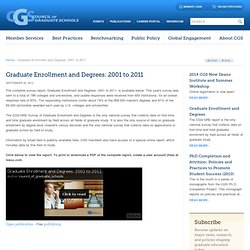
This year's survey was sent to a total of 788 colleges and universities, and usable responses were received from 655 institutions, for an overall response rate of 83%. What Will You Learn? Spoiler: Not as much as they say you will…. « Innovate.EDU. Time for the 2013 Edition of ACTA’s What Will They Learn? ™ report. Colleges Expect Lower Enrollment. The survey, released by the credit ratings agency Moody’s Investors Service on Thursday, found that nearly half of colleges and universities that responded expected enrollment declines for full-time students, and a third of the schools expected tuition revenue to decline or to grow at less than the rate of inflation.
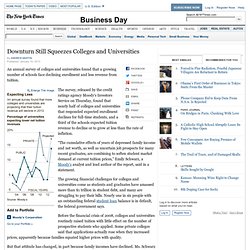
“The cumulative effects of years of depressed family income and net worth, as well as uncertain job prospects for many recent graduates, are combining to soften student market demand at current tuition prices,” Emily Schwarz, a analyst and lead author of the report, said in a statement. The growing financial challenges for colleges and universities come as students and graduates have amassed more than $1 trillion in student debt, and many are struggling to pay their bills. Nearly one in six people with an outstanding federal balance is in default, the federal government says. Community colleges to release scorecard rivaling the president’s. Big list of IdeaFestival 2012 story links. Online Courses: Opening the Ivory Tower? - Education. In a recent post, American Enterprise Institute (AEI) education expert Andrew Kelly highlights a notable trend: prestigious academic institutions are beginning to offer open, online courses.
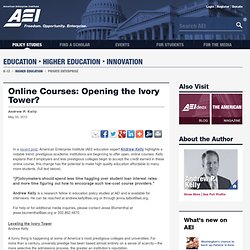
Kelly explains that if employers and less prestigious colleges begin to accept the credit earned in these online course, this change has the potential to make high quality education affordable to many more students. (full text below). " Home - Competitiveness. Customer Service and/or Academic Standards. Customer Service and/or Academic Standards "Academic integrity is not dependent on maintaining an indifference to student needs.
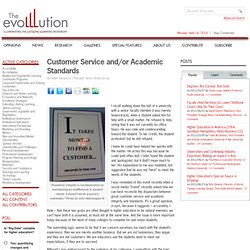
It doesn't serve anyone's interestes. " Photo by John Manoogian III I recall walking down the hall of a university with a senior faculty member (I was merely tenure-track), when a student asked him for help with a small matter. He refused to help, noting that it was not currently his office hours. Future of learning: obsolescence of knowledge, return to real teaching. The future of learning is far more than new devices, digital content and online classrooms.
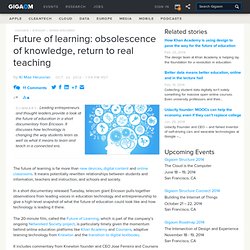
It means potentially rewritten relationships between students and information, teachers and instruction, and schools and society. FutureSchool: A Teen Perspective #edcmooc « Amy's MOOCs: Professional Digi-velopment. Since we’ve been exploring the future of education / ed reform in #edcmooc, I thought I’d share something my IB Theory of Knowledge students participated in last semester, as we examined the Nature of Knowledge / Learning, and the History of “Schooling”.
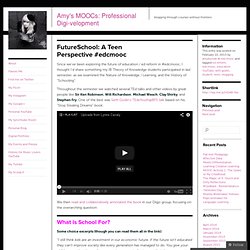
Throughout the semester we watched several TEd talks and other videos by great people like Sir Ken Robinson, Will Richardson, Michael Wesch, Clay Shirky, and Stephen Fry. Why Can Some Kids Handle Pressure While Others Fall Apart? Canada must make profound changes to succeed: Lynch. A modest proposal to reform universities. Research vs. teaching institutions? We Must Embrace Higher Ed Reform. Peering into the Crystal Ball: Challenges for Continuing Higher Education in the Next One to Three Years. Universities and Continuing Industry Education: Making an Impact is Key. How the Student Voice Can Make Education Better. Can We Transform Education with Sal Khan’s ‘One World Schoolhouse’?
Why Education Needs a New Brand. Education has a branding problem. At Stanford, scholars debate the promises, pitfalls of online learning. Accreditation: Removing the Barrier to Higher Education Reform. Abstract: America’s higher education system is in dire need of reform. The average college student leaves school with more than $23,000 in debt, and total student loan debt in the United States now exceeds $1 trillion. Huron Consulting Group. Future Work Skills 2020. Education for Life and Work: Developing Transferable Knowledge and Skills in the 21st Century. Some Practical Experience with that Degree? - At Work. College Degrees Employers Want Most. University of the People – The world’s first tuition-free online university.